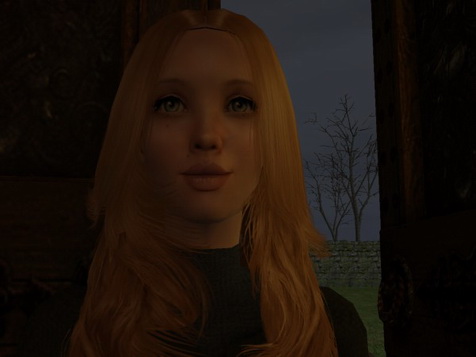
Instinctively Kraaia left the door open at her back. It was the same instinct that had made her count the steps outside and measure their height, the same that had made her pace out the length of the wall, and the same that had made her note the depth of the grass in the uncut field beyond the road: tall enough to hide the body of a crouching girl.
It was the unerring instinct of a cat, who could calculate to a whisker’s breadth the thrust and angle of its high leap, count beforehand every paw step along a narrow beam and out through an attic window, and plot a perfect course through tangled branches on its way down to freedom.
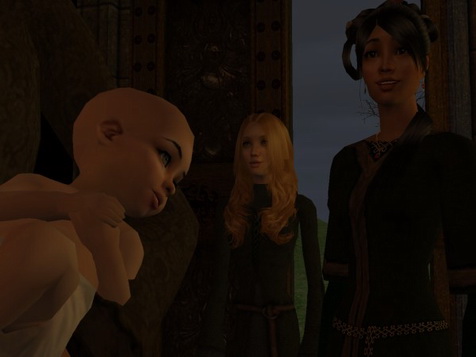
Kraaia saw herself slipping away during the merry confusion of baby-unbundling time, jumping far out over all five steps, and crouching along the wall until she could slip out through the fields and well away: across the river, through boggy coppices and gray meadows on the far shore, and up through stands of dark pines. She would run to where the southern hills met the southering sky, run until she could stand a tiny silhouette against the silvery light, looking back…
Then she would wink out, crossing out of the valley forever, and she would go…
She had nowhere to go.
“Close the door, Kraaia,” Flann said impatiently, “before the baby catches cold.”
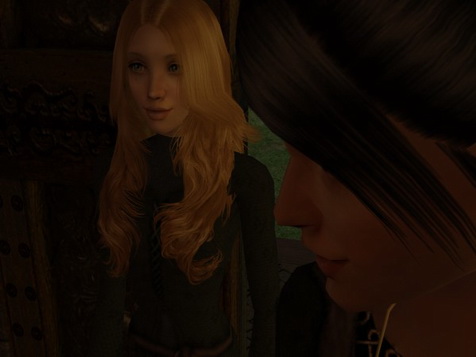
The baby-unbundling time was done. Kraaia dropped her bag on the floor and pulled the door closed behind her.
At once Catan called out a feeble greeting, as though only her ability to act on the door made Kraaia worthy of notice, but even that was immediately submerged by her crowing and cooing over Liadan.

Kraaia had already observed that babies came first, brides came second, and Kraaia came last. Sometimes Kraaia did not come at all, and hours passed before anyone noticed. Time enough to go far.
If only she had somewhere to go.
Warily she watched the chattering elves and ladies, all the while sliding her bag closer to the stairs with her foot. With the instinct of a cat, she wanted at least to climb out of reach if she could not get away.
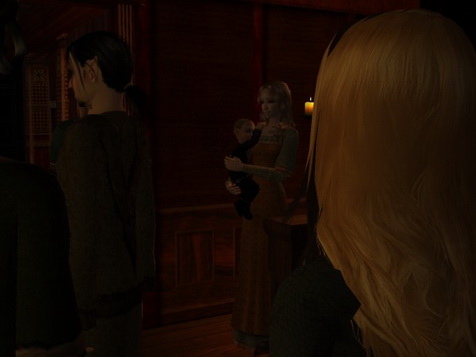
If she had known which room upstairs was meant for hers, she might have simply dashed for it and locked the door. But she had never been upstairs, and had only visited the house three times before: once with Condal, who had not dared a second attempt at friendship after Kraaia’s bare-clawed reaction to the first; and twice with Lady Gwynn, who simply could not be rebuffed.
But perhaps she could, Kraaia remembered suddenly. Perhaps she had.
Kraaia shoved her bag against the bottom step and pulled her coat tighter.
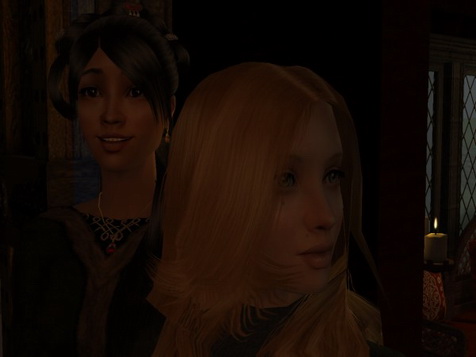
Even so, she told herself, Gwynn could never forget her, though they never met again: their separation had been sealed with a scar. Many years hence – when Kraaia herself would long have lain in her tomb, forgotten by all men – Gwynn would be telling her vulgar, violet-eyed grandchildren: “A blonde-haired girl named Crow gave this to me when we were young together. In happier times…”
Kraaia always imagined Gwynn unhappy when she imagined her old.
This was her last thought before they all descended on her, like a herd of brooms chasing a cat up the stairs. Instinctively Kraaia whipped herself around to face the nearest: a pair of outstretched, approaching arms.

“Kraaia!” Paul grinned at her. “Welcome home! May I take your coat?”
Instinctively Kraaia jerked her collar closed. “No! It’s freezing in here!”
Flann laughed deeply behind her. “Fie! If that isn’t the first time anyone has ever criticized your fire-building, Paul!”
“Perhaps she isn’t used to our winters,” Paul said. He turned to pat Catan’s arm and distract her from gabbling at Liadan. “Mina,” he asked anxiously, “you don’t think she’ll be too cold up in that room, do you?”
Catan shrugged her unburdened shoulder. “We shall put her in Connie’s if she is, and see what to do about Connie when next she sleeps home.”
“If she ever does!” Kraaia interrupted with a bitter laugh. “I somehow doubt Alred will let his precious daughter’s best friend get anywhere near the corrupting influence of me!”
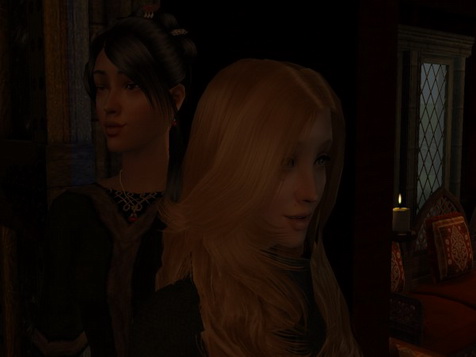
They all stared. Kraaia forced herself to laugh again: the sort of laugh that was like forcing a ball of clay through a sieve.
Then Paul smiled one of his effortless, engaging smiles. “I somehow think he rather wants to keep Connie for her own sake, but she’s welcome here whenever she wants to come. And Gwynn is too. And so are you.”
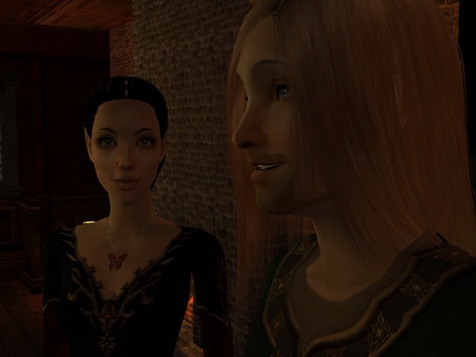
“And if I don’t want to come?” Kraaia muttered to herself, remembering too late that elven ears could hear. Flustered, she made up her mind to bolt for the stairs after all, but she was immediately faced with a formidable obstacle coming down: Catan’s female Goliath of a maid.

“Kraaia!” the girl panted as she thundered in.
“Kraaia!” Paul echoed. “You know Cat’s maid Derbail, don’t you?”
“And your maid too, now,” Derbail said, “if you’ll be – ”
Kraaia pulled her coat tighter and snapped, “I don’t need a maid!”
Derbail nodded her head politely, but she continued downward into a deep bow. Kraaia did not understand what she was doing until she said, “I can at least be taking your bag up – ”
Kraaia crouched to snatch at the handle, but Derbail did not let go, and Kraaia tugged helplessly as they straightened together.
Derbail blew her bangs out of her eyes and whispered eagerly, “You wouldn’t be smuggling any Nothelm candy in here, would you be?”
Kraaia yelped, “No!” and savagely yanked the handle out of Derbail’s fat fist. She fell back against the door, panting with the effort and with anger.
Only yesterday morning – only yesterday morning – the girls had made candy for the party: Gwynn and Margaret and Condal and Kraaia, attired in the spotless aprons that noble girls affected when they deigned to perform kitchen tasks, giggling and gorging on nuts and dried fruit, and making as much mess as candy.

Only an hour ago Kraaia had packed her own bag, and she had scarcely let it out of her sight since. She knew she had taken no candy, and still more surely she knew that no one else had slipped a little packet inside either, be it as a treat, as a comfort, or as a silent way of saying goodbye.
She knew it, and nevertheless she would now have to search her bag later to see whether any one had. She decided she would hate Derbail forevermore.
“No candy during Advent, Derbail,” Paul said warningly.
Catan and Lena giggled.
Paul turned to ask them, “What’s so funny?” and Kraaia saw her chance. She tucked her bag beneath one arm and reached out for the banister with the other as she leapt, but Derbail’s strong arm shot out and caught her squarely and painfully across the chest.

“Fie, now, you haven’t made a greeting to Dina!” Derbail was smiling, but her black brows were scowling behind her bangs.
In the time Paul hesitated between these two problems, Catan dropped Liadan in his arms and gasped, “Dina! Paul, you take this baby – Dina!”
She swept Kraaia out of Derbail’s arm and led her around the side of the stairs.
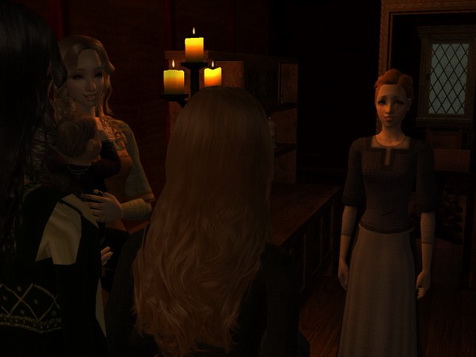
Kraaia’s heart throbbed. The girl was blocking her path to the side door and freedom, but her very person seemed an escape of sorts: she was scarcely older than Kraaia, and her freckled cheeks were a healthy pink and her broad smile boyish. She looked like fun.
“Hallo, I’m Dina!” the girl said. “Or Ed–ina,” she corrected gravely, making a deliberately affected curtsey.
“Kraaia,” Cat said, “this is Edina – she cleans the house and helps the cook.”
“But today I am the cook!” Edina said proudly. “Since Cook and me usually have Sundays off, and I lost at straws,” she winked. “My first goose solo!” She bowed grandly and unaffectedly, like a man. “Two! with different gravies. How do you like that? Just ’cause of you coming!”
Kraaia’s wavering smile soured at once, and the soft hair on her neck and arms bristled. Instinctively she snapped, “I don’t like goose.”

“Don’t like goose!” Cat laughed. “Fie!” She tried to pat Kraaia’s shoulder, but Kraaia twisted it away.
“Especially not with gravy,” she sneered. “I’m sorry you went to all that trouble just ’cause of me. Next week you all can go back to your Sunday at Nothelm as if I never was, and Cook and Dina can have off, and I shall just content myself with a crust of bread.”
She could only feel the discomfort of the others like a cold fog at her back, but the pain on Edina’s face was plain, furrowing the freckled skin of her brow. Kraaia knew it took no more than a single claw-swipe to deflate unguarded enthusiasm and simple pride. Edina would never speak so freely with her again.
“I shall stay!” Lena said breathlessly beside her. “Penedict and I!”
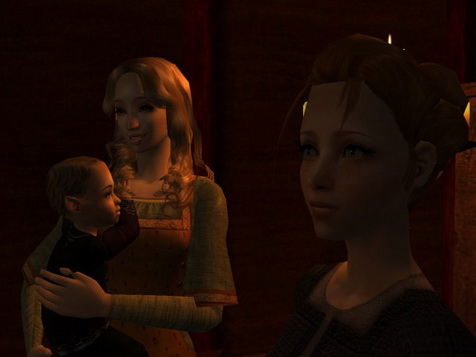
Lena was so unaccustomed to speaking unless spoken to that her cheeks turned deeply red as everyone turned to look at her. But Catan smiled in encouragement, and Lena gabbled on.
“We three can stay here and cook our own dinner! It will be fun!”
“That’s a fine idea!” Catan laughed. Her relief was audible. Kraaia knew she was glad to have the problem of Nothelm Sunday dinners solved, and she vowed to hate Catan forevermore for being glad to be rid of her.
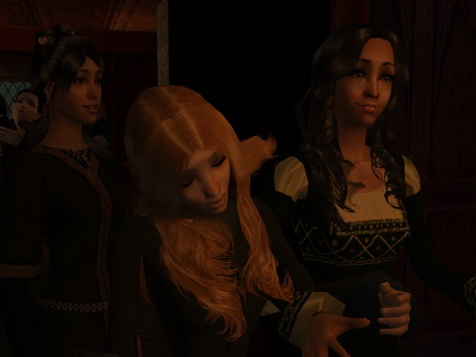
“Do you even know how to cook?” Kraaia groaned.
“No!” Lena giggled. “That is the fun! I know how to cook soup, and boil every kind of veg-e-ta-ble, and boil an egg, this I know! Together we learn.”
“I’m twelve and I already know how to cook more than you do,” Kraaia muttered.
“Then you teach me!” Lena said brightly. “And Penedict, he can mash every kind of veg-e-ta-ble…” She snorted and giggled at her own pending joke. “…with his hands!”
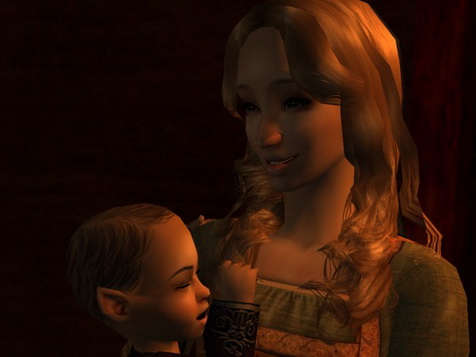
Kraaia rolled her eyes. Apparently Lena was not so easily rebuffed either.
“I hear she knows how to make candy!” Cat whispered to Lena and Benedict.
Before Paul could protest, Kraaia howled, “No candy!”
“During Ad–vent!” Lena crooned, blushing again at her audacity.
Everyone but Kraaia laughed, and little Benedict was reassured enough by the general merriment to reach out to Kraaia, intending as a greeting a healthy tug on her hair.
Kraaia shrieked and swatted his little hand away. She tried to run, but she stumbled into Cat’s arm, and she squealed and threw her back against the banister, clutching her bag against her chest in a last defense.
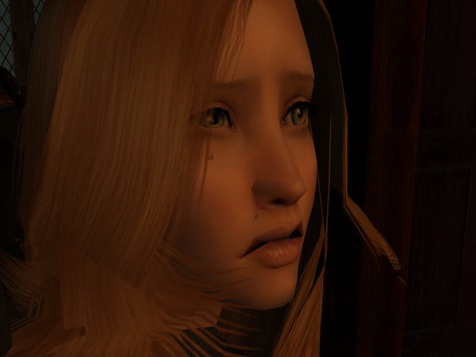
They all stared at her in confusion – she felt their stares like the cold rays of many icy suns – and Benedict ventured a little wail.
Kraaia bleated, “He hurt me!” but her jaw was quivering out of control. She would have to flee, if it meant pummeling anyone who stood in her way with her bag. She had to run.
Then she heard Osh’s warm voice at her side, and she could tell by its angle that he was staring not at her but at Catan.
“Cat, why don’t you take Kraaia up to see her room?”

For an instant Kraaia thought she would rather Osh took her up to see her room. She immediately resolved to hate Osh forever for making her want him.
“That’s a fine idea,” Catan said. “May I carry your bag?”
“No one,” Kraaia panted, “touches my bag!”
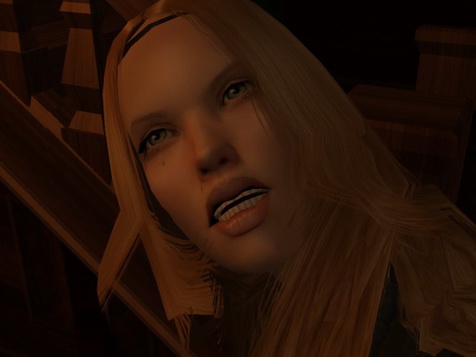
Catan took a deep breath. “Of course not, darling. Follow me.” She turned and marched stiffly up the stairs.
Kraaia only watched her go; as she imagined herself following she suddenly saw the vulnerability of a girl’s bowed back as she climbed above the disapproving eyes of a crowd – saw it like a glimpse of her own future, wherein she would climb to the height of a gallows.
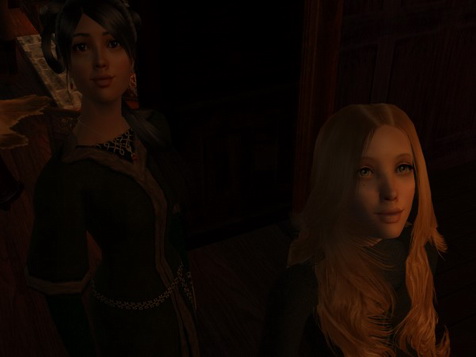
“Go ahead, Kraaia,” Paul said gently. “There’s plenty of time before dinner.”
She muttered, “I’m not hungry anyway,” but she climbed.
She passed a window on her right and saw the southern hills and the sky above them through the little panes. Each diamond was deeply overcast, puffed and tufted like a comfortless quilt. The hills were uncountably many miles away, lost in fog. She paused to look out, as though it were her last sight of earth.
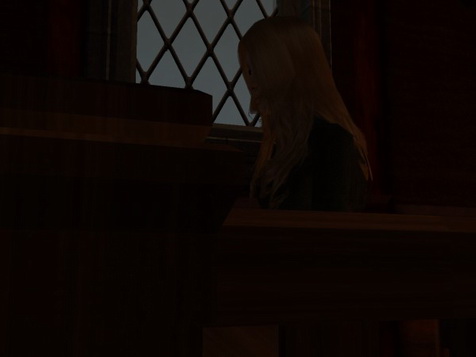
Then she pulled her coat tighter with her free hand and marched to the top. She thought she had counted thirteen stairs.
She had not seen where Catan had turned, but she followed the light through an open door.
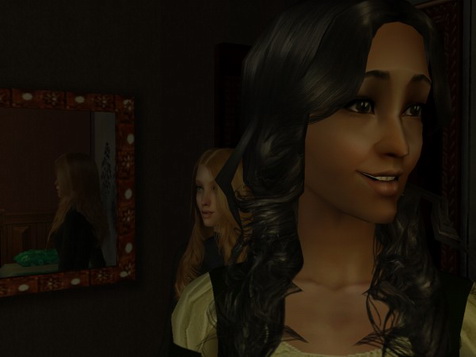
Her heart throbbed, and her breath seemed sucked away by a boreal wind. It was the astonishment of a cat who climbs the highest branches of a tree only to find they trail off into the tangled roots of another still higher – or of a girl who climbs to the crest of a hill and breaks through clouds to find a second, silver-lit landscape beyond.
She had seen Osh’s cloyingly cunning paintings of flowers and beetles and birds, but she had never seen anything like this. The hills were impossibly high, and the bays that forked between them impossibly narrow, but there was such a striking rightness to them she was certain she had seen such hills and bays before.

He had painted the wind and the silence, too; painted the dizzying steepness of the hills and dizzying distance of the sea; painted the fog that lower men took for clouds; and above them painted the passing clouds. He had painted the cold and the air. Like an angry god, he had painted it all in gray, and turned it to stone.
She wanted to ask him where this country was. There she would go.
“Pretty, isn’t it?” Catan chirped. “Osh painted all this.”

Kraaia held her breath.
“It’s supposed to be Scotland!” Catan chortled. “That’s no more than what Flann and I deserve for our tall-tale-telling! The steepest mountains in the world,” she intoned. “The deepest lakes!” She laughed. “Poor Osh! But the Lord knows he meant it to make Flann happy, and a blessing it will be to him when he’s reaching Heaven.”
It was nowhere. It was not a real country. Kraaia hated Osh and Flann and Catan and everything.
And she snarled defiantly, “I hate Scotland!”
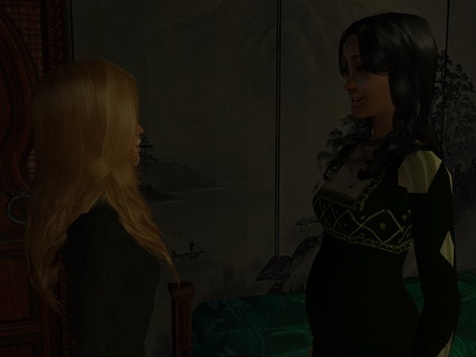
Catan laughed, unperturbed. “It’s a lucky thing for you, then, for not a bit like home does it look to me. Or mayhap the Highlands, but I’ve never been. Here’s your night table, darling, you can put your little things in here. And there’s the trunk for your clothes, and pitcher and basin and glass, and all you’ll need.”
She waddled placidly between Kraaia and the bed to the door.
“You may be unpacking your bag if you like, and come down whenever you’re ready. Or be resting a while if you will.”
She went out.
“And don’t be trying the window!” she called from the stairs. “It doesn’t open!”

Kraaia shut the door so quietly that only elves could have heard it clink. She tried the window and found it did not open. She dropped her bag on the bed and slid her hand around the inside in search of candy, folded parchments, or other gifts. She found nothing but her own borrowed or hand-me-down clothes.
She slung the bag onto the floor and kicked it beneath the bed. She knew better now than to unpack. She would only have to pack it again in a week or two.
She slung herself into the soft chair and pulled her coat tightly closed over her little bumps of breasts. They were still sore from Cedric’s mauling hand. Whenever she jostled them she hated Cedric, and she hated her breasts too.
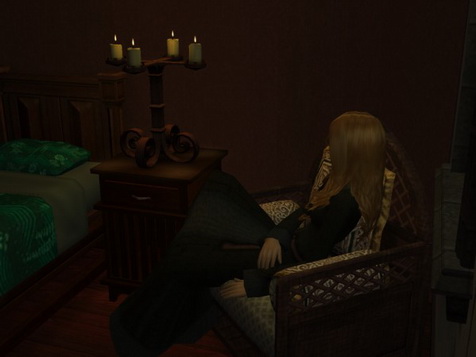
Cedric was only a boy like any other, for to him she was only a girl like any other: lips to kiss, breasts to grope, holes to stick things in. She no longer dared go to Cedric.
She could not go to Leofric either, nor even run away to meet him somewhere on his road, as she had planned: far enough away that he would have been obliged to take her with him the rest of the journey. To Leofric she was only a cunning little girl, and not one of his own.
He had not even come to say goodbye, but only sent a note by way of Joseph: Behave for Catan, take care of yourself, make me proud of you, and so on. She had not dared ask Joseph whether the “Leof” at the end was supposed to be an affectionate word or merely his name. She hated Joseph.
She tipped her head back against the chair and lifted her face into the leaden light: dim and low though it was scarcely noon. Each gray day was coming shorter than the last, like a coat pulling tighter. Only a few more had yet to pass before she would have lived an entire year without love.
She hated the winter. She hated death and life. She had nothing to look forward to. She had nowhere to go.










Aww, I do feel sorry for her now. She is so unhappy and angry. (And I'm thinking more and more, especially after reading this, that our little matchmaking thought is more perfect than ever...)